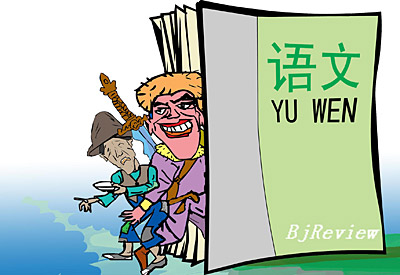
Traditional Chinese school textbooks are getting a new look after a recent initiative in Beijing saw its high schools' Yu Wen (Chinese language and literature) textbooks updated. Change to the books, described as "daring and unprecedented," means a range of more modern literature replaces some old classic literary works.
The new Yu Wen textbooks, which took several years to complete, has taken the radical step of dropping over half of traditional contents, learned by generations of Chinese. Much of the new literature was written and gained popularity after the 1970s.
As part of the change, the new Yu Wen textbooks selected an extract from Xueshan Feihu, or the Flying Fox of Snowy Mountain, written by contemporary martial arts novel master Jin Yong. Recommended by several compilers, the article is selected to give youngsters a glimpse of the Hong Kong writer's descriptive writing style on character's psyche, natural scenery and China's unique martial arts culture. To keep right up to date, the new textbooks even included an article on the newly emerging "internet language" as additional reading.
Among the dropped contents, classic literary works make up a big part. These include many historical and political essays written by ancient Chinese historians or politicians. Besides old classics, a number of traditional pieces from pioneering literary masters, such as Lu Xun, written in modern Chinese in the 1920s and 1930s, were also removed.
While the compilers believe that these textbooks can help students maintain their enthusiasm for Chinese with a mixture of past and present literature, others feel it's unwise to drop so many old classic works, as too many modern romantic stories may mislead adolescents.
Change is inevitable
Deng Xuezhi (www.xinhuanet.com): Language has a life, which is reflected in its development with the times. If it is cut off from real life, the language will wither away and die. Chinese textbooks are responsible for spreading knowledge of this language, so the passages in the textbooks must be standard, conforming to the language's traditional usage and reflecting real life. This is what a responsible and well-developed language teaching system is expected to do.
Besides, after all, Yu Wen books are not history books. Historical facts are unchangeable, but Yu Wen don't have to obey this rule. Yu Wen are expected to keep up with the times and reflect changes in society.
If these textbooks are stuffed with outdated stories, and are passed down from grandfathers to grandsons without any alterations, surely people will grow tired of them. Only those books that reflect the development of the times, cover various topics, propose all kinds of values and tell students how to analyze and compare facts, can help learners develop the proper values of life.
The new Yu Wen textbooks in Beijing's high schools have updated contents and even make space for the Internet language. All these changes reflect the efforts to keep the books current and this is what is needed to keep students interested in learning Chinese.
Wu Jie (www.people.com.cn): Jin Yong's martial arts novels have won universal praise among the Chinese, and they have a solid readership. To some extent, his novels have become part of some Chinese literature and life. The popularity of Jin's novels is obviously attributed to the rich cultural, traditional and historical factors and the deep thinking on the values of life he weaves into his stories.
Since Jin's books are so widely appreciated and recognized by the Chinese, why are they still banned from appearing in textbooks? Is it because that they are martial arts novels?
Like the masterpieces of literary geniuses like Lu Xun, Jin's novels are also part of Chinese literature. It's true that Jin's works can never replace Lu's, but the success of one should not be blamed upon the waning interest in the other.
Li Shaoqiang (The Beijing News): In traditional Chinese textbooks, teachers put the stress on the thinking and theme of a passage while students focus on the understanding of the hidden meaning of key passages. As a result, the Chinese language classes, supposed to develop students' expressive capability and improve their cultural knowledge, become very dull affairs.
The "invasion" of Jin Yong's martial arts novels, however, will help to bring back the original role of Yu Wen teaching and also promote its reform.
Although Jin's novels have some traditional cultural deficiencies, as popular works of fiction, they can express cultural ideas through fictitious characters. This is an excellent way to spread culture. At the same time, while igniting students' interest in reading, Jin's novels can also help them with their wording and phrasing, which is another important part of Yu Wen.
